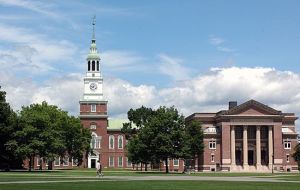
The plan of action I would recommend is one that fosters a spirit of all-encompassing solidarity between Greek organizations on campus.
The Dartmouth College Greek system, akin to similar establishments at colleges and universities across America, disseminates many positive effects on campus, such as provision of a natural and proven avenue for social integration in higher education and its critical position in the unique and storied tradition of this great academic institution – not to mention the multitude of unaffiliated “free riding” students who also enjoy its benefits. However, there exist fellow Dartmouth students who have decried this arrangement as intrinsically unfavorable and worthy of eradication.
In light of the growing retaliatory attitude of negativity that has emerged surrounding the Dartmouth College Greek system, it seems that critics of the institution as is stands have focused more on impetuous damage control to coddle a cynical national press rather than tangible solutions to specific problems facing real students. Consequently, both unfairly draconian measures implemented by the administration and indignant demands for elimination from unwarrantedly consternated individuals are creating a burgeoning Kulturkampf between affiliated students and those desiring unfoundedly stringent changes in the status quo. Just as the Prussian Empire intentionally persecuted the Roman Catholic Church from 1871 to 1878 to reduce its sociopolitical influence and appeal to German Protestants’ populist views, College administrators cater to the unrealistic viewpoint of a disaffected group of baldly self-interested students while disenfranchising the affiliated, causing dissension not only among current undergraduates, but within the extensive Dartmouth alumni network as well. President Hanlon is being forced into an unduly Bismarckian role by an ostensibly oligarchic Parkhurst Hall, which is looking more and more like the Reich Chancellery than the Reichstag.
Putting metaphor aside, it is generally true that people do not respond well to unjustifiably loud and gratuitous methods promoting social change – this includes fraternity brothers, sorority sisters, and co-ed members alike. An aura of prejudice against the affiliated has undoubtedly descended on this campus, propagating understandable antagonism, making the Greek system arguably more exclusionary than it was before. Instead of using raucous and divisive approaches to solving problems, concerned persons should instead allow individual houses to first choose the best preliminary course of necessary action – an alumni committee composed of members from each house could also provide an increased advisory role. College decision makers should additionally grant the Greek system a period of time where it would be given a chance to self-correct apparent deficiencies in safety and member integrity where they exist – it is simply unethical to take drastic measures that punish a large group of people for the actions of a few bad individuals (who likely had issues before coming to Hanover). By offering an opportunity for Greek life here to catch its breath and self-alleviate definite pressures, the administration just might ameliorate current problems facing the Greek system in a much more transparent way and eliminate grounds for negative, superficial journalistic critiques of college policy that damage this school’s international academic reputation.
It is paramount to delineate specific methods that individual houses must use to retain the Greek system as we know it in the long run. It is clear that certain problematic issues exist within the current structure, but I propose what I believe is a far more felicitous initiative to silence claims of supposedly inherent exclusiveness; stabilize relations between concerned alumni and harried administrators; and restore the tight-knit Dartmouth community.
The plan of action I would recommend is one that fosters a spirit of all-encompassing solidarity between Greek organizations on campus through greater mutual effort, possibly in the form of regularly scheduled social and/or service events with a rotating selection of houses. A once-a-term function including all Greek houses, perhaps organized by the Interfraternity Council and located on the Green, might be a start. Similar to the foundation of the Delian League in 478 BC, in which independent Greek city-states led by Athens banded together to become stronger, increased cooperation among respective Greek Letter Organizations and Undergraduate Societies would invigorate the College’s Greek system. Not only could this expand the social dynamic in a positive way, but would sustain the “old undying faith” held for our cherished school – not only on an individual or faction basis, which already exists – but allow the greater good of community essence at Dartmouth to thrive.
Thus, as opposed to mandating a detrimental imposition that would essentially give an eventual death sentence to an entity that has not yet been given a fair trial, the Greek system itself should take initiative, with support from the Administration, to pursue character standards representative of Ivy League students; to recognize the effects of its behavior and direct reflection on Dartmouth as a whole; and to engage in systematic operations that encourage inter-cooperation and could have the potential to leave all parties satisfied.
One should not rashly promote obstructive ideas as “progress” before first performing careful analysis to see if the concept has overly regressive qualities. In the case of profoundly changing or eliminating the Greek system, costs far outweigh benefits, and this mistake is a virulent fallacy that would cause much greater alienation and discord than the purported reduction of allegedly inordinate exclusiveness. For the sake of future Sons and Daughters of Dartmouth, we must preserve the most revered and treasured nonacademic constituent of the one and only Dartmouth experience. I am certainly thankful that my great-grandfather and great-great-grandfather did not let our traditions fail.

Be the first to comment on "Status and Solidarity"